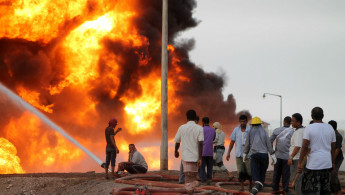Yemen: Officials say pipeline attack will not affect supply
A suspected terrorist attack at an oil refinery in Yemen will have no effect on local supply of oil products, officials said on Friday.
2 min read
Officals think either IS or al-Qaeda could be behind Friday's attack [Getty/Archive]
Yemeni officials have said a key pipeline targeted in a suspected militant attack in Yemen's second city of Aden will not affect the local oil supply.
On Friday, firefighters managed to contain a huge blaze that ripped through the pipeline overnight.
"I would like to confirm that the local market's supply of oil products to Aden and neighbouring provinces will not be affected by the terrorist bombing," the head of public relations at Aden Refinery Company, Nasser Shaif, told The New Arab.
"The storage tanks connected to the oil terminal to the refinery and power plant are not damaged, and there were no casualties" the official said.
Shaif said the pipelines that were damaged in the attack transported crude oil, adding that they "should be repaired by the end of the day".
A security source said that an explosive device detonated by unknown assailants hit the line around 500 metres from the refinery and three kilometres from the oil terminal.
A brief firefight broke out in the wake of the blast between refinery guards and gunmen, who fled the scene in two vehicles, according to witnesses.
A security official said that either the Islamic State group [IS] or Yemen's al-Qaeda branch could have been behind the attack.
"We are at war with the jihadists and I don't rule out the possibility that the orchestrators of the attack could be supporters of IS or al-Qaeda," the official said.
A security source said a search near the site of the attack uncovered a den where jihadists allegedly manufactured car bombs.
Rocket-propelled grenade launchers and other ammunition were found along with jihadist banners bearing slogans used by IS, the source added.
Aden is being used as a base for Yemen's government, which was forced to flee the capital Sanaa in September 2014 after Iran-backed Houthi rebels swept into the city.
The Houthis advanced into southern and central Yemen, prompting a Saudi-led coalition to begin air strikes in March on insurgent positions.
Extremist groups have exploited the chaos to spread, mainly in Yemen's vast desert east, and witnesses report that militants including IS are active in some Aden neighbourhoods.
More than 5,800 people have been killed in Yemen since the start of the Saudi-led bombing campaign against rebels, about half of them civilians, according to the UN.
On Friday, firefighters managed to contain a huge blaze that ripped through the pipeline overnight.
"I would like to confirm that the local market's supply of oil products to Aden and neighbouring provinces will not be affected by the terrorist bombing," the head of public relations at Aden Refinery Company, Nasser Shaif, told The New Arab.
"The storage tanks connected to the oil terminal to the refinery and power plant are not damaged, and there were no casualties" the official said.
Shaif said the pipelines that were damaged in the attack transported crude oil, adding that they "should be repaired by the end of the day".
A security source said that an explosive device detonated by unknown assailants hit the line around 500 metres from the refinery and three kilometres from the oil terminal.
A brief firefight broke out in the wake of the blast between refinery guards and gunmen, who fled the scene in two vehicles, according to witnesses.
A security official said that either the Islamic State group [IS] or Yemen's al-Qaeda branch could have been behind the attack.
"We are at war with the jihadists and I don't rule out the possibility that the orchestrators of the attack could be supporters of IS or al-Qaeda," the official said.
A security source said a search near the site of the attack uncovered a den where jihadists allegedly manufactured car bombs.
Rocket-propelled grenade launchers and other ammunition were found along with jihadist banners bearing slogans used by IS, the source added.
Aden is being used as a base for Yemen's government, which was forced to flee the capital Sanaa in September 2014 after Iran-backed Houthi rebels swept into the city.
The Houthis advanced into southern and central Yemen, prompting a Saudi-led coalition to begin air strikes in March on insurgent positions.
Extremist groups have exploited the chaos to spread, mainly in Yemen's vast desert east, and witnesses report that militants including IS are active in some Aden neighbourhoods.
More than 5,800 people have been killed in Yemen since the start of the Saudi-led bombing campaign against rebels, about half of them civilians, according to the UN.





 Follow the Middle East's top stories in English at The New Arab on Google News
Follow the Middle East's top stories in English at The New Arab on Google News
![Israeli forces ordered bombed Gaza's Jabalia, ordering residents to leave [Getty]](/sites/default/files/styles/image_330x185/public/2176418030.jpeg?h=a5f2f23a&itok=_YGZaP1z)

